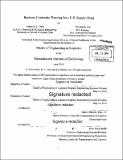Business continuity planning for a U.S. supply chain
Author(s)
Chee, Arthur K. L. (Arthur Kuan Loong); Lee, Tzu-Hsueh
DownloadFull printable version (6.241Mb)
Other Contributors
Massachusetts Institute of Technology. Engineering Systems Division.
Advisor
James Blayney Rice, Jr.
Terms of use
Metadata
Show full item recordAbstract
The research objective was to provide a directional sense of some key considerations for business continuity planning (BCP) specific to a company's downstream distribution operations in the U.S. This was achieved via a two-pronged strategy comprised of quantitative and qualitative elements to complement insights gained from the literature review. By quantitatively assessing the financial impacts arising from four hypothetical scenarios, the business impact analysis (BIA) showcased the merits of short time-to-recovery (TTR) in the event of a disruption. However, available information also appears to suggest that the estimated financial impact from carrying high-value inventory is not necessarily insignificant. Hence, a company may want to mitigate the likelihood of a scenario whereby large amounts of inventory become damaged. Qualitative information from industry participants in the study highlighted the importance of tailoring continuity plans to the unique supply chain needs of an organization.
Description
Thesis: M. Eng. in Logistics, Massachusetts Institute of Technology, Engineering Systems Division, 2014. Cataloged from PDF version of thesis. Includes bibliographical references (pages 79-80).
Date issued
2014Department
Massachusetts Institute of Technology. Engineering Systems DivisionPublisher
Massachusetts Institute of Technology
Keywords
Engineering Systems Division.